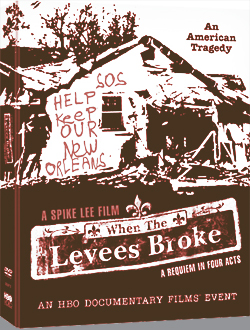Lessons from "The Levees"
- George Santayana
The power of Spike Lee's four-hour HBO documentary, When the Levees Broke: A Requiem in Four Acts, is not simply its kaleidoscopic rendering of Hurricane Katrina and the enormity of Katrina's ongoing impact. The film also painfully captures the sense of Santayana's words, leaving viewers to ask: How could this happen in the richest nation in the world? What should we learn from this? What do we need to do differently next time?
"I think when we look back on this many years from now, I'm confident that people are gonna see what happened in
Now, with a grant of $975,000 provided by the Rockefeller Foundation, TC Professor Margaret Crocco and a team of the College's faculty, students, graduates and staff are designing a curriculum that explores precisely those questions and others that focus on issues of citizenship and social responsibility.
"Teaching The Levees: A Curriculum of Civic Engagement to Accompany the HBO Documentary Film Event, Spike Lee's When the Levees Broke: A Requiem in Four Acts"-'"a package that includes the DVD-set of Spike Lee's documentary film along with a 100-page curriculum book supported by online resources-'"is designed to facilitate "a conversation about a tough topic in a way that will bring participants to an understanding of some kind," says Crocco, and to serve as a curriculum that would be "pertinent across time and place."
"We are trying to suggest this is not a problem only for
"Teaching The Levees" will be distributed by TC Press free of charge to 30,000 high school and college teachers, and community, civic and religious groups around the country by the end of August, in time for the second anniversary of Katrina. A Web site, www.teachingthelevees.org, created and maintained by EdLab at Teachers College's Gottesman Libraries, is the collection center for the names of people who wish to receive the package. The creators of the curriculum plan to follow up with those who request the curriculum to get feedback, evaluations and ideas on how they used the package in their classrooms and groups.
The creators worked in several teams to produce five categories of lessons, including economics, civics, history, geography, media literacy, and lessons for community, civic and religious groups. "We focused on the questions: -'Who are we as a country?', -'Who do we want to be?'," Crocco explains. Every lesson, in fact, is structured around a big question related to some aspect of the film.
For example, a section on a previous flooding disaster that befell the
Yet the performance of FEMA in the aftermath of Katrina underscores the reality that a bureaucracy is no substitute for personal response. In
Other topics addressed in the "Teaching The Levees" project include the question of whether low-lying areas should be rebuilt; as well as a lesson on how space, race and poverty converge in this tragedy; New Orleans and its sense of place and home; media coverage of the events surrounding the hurricane; and the idea of disaster preparedness and the problems related to not being prepared for such events.
Each lesson is designed to encourage groups to gather information that produces "democratic dialogues," Crocco says. "We want an honest debate about these issues." Reasoned discussion should ultimately lead to some type of action, she adds. For example, some lessons encourage teachers and students to investigate their own community's disaster plan or to do something that signals a sense of responsibility to others in the community.
In addition to lesson plans, supplementary curriculum materials and resources for professional development are being developed in collaboration with EdLab for the "Teaching The Levees" project Web site. Diana Hess, who has taught about the teaching of controversial issues, is one educator who will write a piece for the Web site. Jane Bolgatz, author of Talking Race in the Classroom, and Gregory Thomas, Deputy Director of Planning and Response in the
"Teachers often don't bring up topics of race in the classroom-'"it's part of the evaded curriculum," Crocco says. "With a well-prepared teacher, you might get more debate about sensitive problems."
In order to ensure that the material in the package is relevant to the issues raised, an advisory board consisting of experts in different areas related to the curriculum has reviewed the lessons and provided feedback for the teams. The board includes Hess, Bolgatz and Thomas; Douglas Brinkley, an historian from Tulane University and author of The Great Deluge: Hurricane Katrina, New Orleans, and the Mississippi Gulf Coast; Gloria Ladson-Billings, an education professor at the University of Wisconsin, whose expertise concerns teaching about race; Henry Louis Gates, The Alphonse Fletcher University Professor and Director of the W.E.B. DuBois Institute for African and African American Research at Harvard University; Milton Chen, an expert in educational media and Executive Director of the George Lucas Educational Foundation; and several other prominent historians, professors and experts on race, history and the Gulf Coast Region.
Preliminary curriculum ideas were vetted by focus groups held at the annual meeting of the National Council for the Social Studies in December, where several teachers volunteered to "test drive" the material in their own classrooms once it is finalized.
"While -'Teaching The Levees' clearly originates from a sense of bewilderment and even outrage at the unaided suffering associated with Katrina, it does not preach," Crocco says. "There is enough ambiguity in the film to engage people in a dialogue that will lead to debates and different points of view. The teacher's obligation is to create a climate in which that is possible."Published Friday, Feb. 23, 2007
